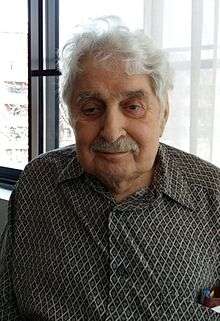Harry Gulkin
Harry Gulkin (November 14, 1927 – July 23, 2018)[2] was a Canadian film and theatre producer, arts director, and project manager from Montreal, Quebec. He produced the Golden Globe-winning film Lies My Father Told Me.
Harry Gulkin | |
|---|---|
 Gulkin in May 2016 | |
| Born | November 14, 1927 |
| Died | July 23, 2018 (aged 90) Montreal, Quebec, Canada |
| Nationality | Canadian |
| Occupation | Filmmaker |
| Children | 3, including Sarah Polley[1] |
Life and career
Gulkin was born in Montreal, the son of Raya (née Shinderman) and Peter Gulkin, who were Russian-Jewish immigrants.[3] Shortly before World War II ended, Gulkin left Baron Byng High School and entered the merchant marines. When his service ended, he returned to Montréal and began social advocacy work. Gulkin then joined the Canadian Tribune, a communist weekly. There, he worked as an art critic and business manager.
He renounced communism in 1956 after the atrocities of the Stalin regime in the Soviet Union were admitted. He then became a marketing executive at Steinberg's supermarket chain.[2]
In 1970, he decided that he wanted to make films. His first major success was the 1975 drama Lies My Father Told Me. Adapted from the story by Ted Allan, the film was nominated for an Academy Award for best screenplay, and won a Golden Globe for best foreign film.
From 1983 to 1987, Gulkin was director of the Saidye Bronfman Centre for the Arts. In 1987, he began a 20-year tenure as a project manager with the Société de développement des entreprises culturelles.[4]
Filmography
- 1975 – Lies My Father Told Me
- 1978 – Two Solitudes
- 1978 – Jacob Two-Two Meets the Hooded Fang
- 1985 – Bayo
- 2005 – Red Dawn on Main Street[4]
Personal life
Gulkin married Ruth Penner in 1950 and had two children from that marriage: Catherine (b. 1954) and James Peter (b. 1957). He married Marie Murphy in 1990.
In the 2012 documentary film Stories We Tell, it was revealed that he was the biological father of the film's director, Sarah Polley, through an affair with Polley's married mother Diane Elizabeth Polley (née MacMillan).[1]
References
- Howell, Peter (5 October 2012). "Sarah Polley doc Stories We Tell: When blood is thicker than gossip". Toronto Star. Retrieved 17 March 2014.
- https://montrealgazette.com/opinion/columnists/lived-many-lives-legendary-montreal-filmmaker-harry-gulkin-has-died
- https://www.theglobeandmail.com/arts/film/article-montrealer-harry-gulkin-was-a-champion-of-canadian-film/
- "The Canadian Encyclopedia". The Canadian Encyclopedia. Retrieved 2014-03-17.